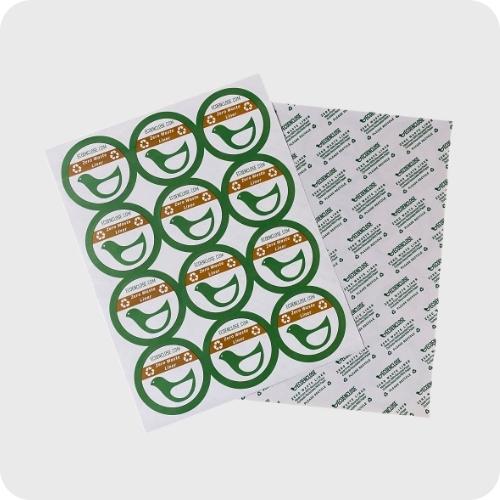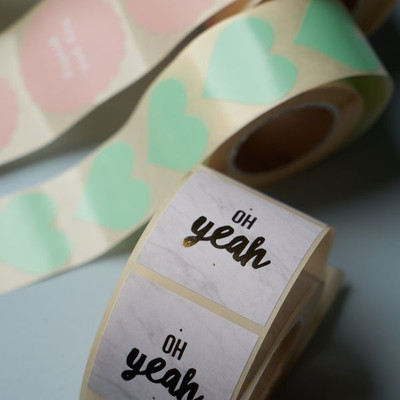Finding the Most Sustainable Custom Stickers for Your Brand
Posted on May 9th 2022
Finding the Most Sustainable Custom Stickers for Your Brand
Stickers and labels are everywhere.
Almost all products we buy have labels for branding and product information. For example, fruits and vegetables have tiny PLU stickers, eCommerce orders have shipping labels, and vitamin bottles have product labels. In addition, fun, personality showcasing stickers are becoming popular gifts and giveaways (often ending up on car top carriers, laptops, and water bottles). And stickers are commonly becoming part of a brand’s delivery and unboxing experience.

Things as ubiquitous and small as custom stickers often become an afterthought. Many brands make thoughtful, research-driven decisions about how to ensure they have sustainable shipping boxes or eco-friendly mailers. But, it is easy to forget about the sustainability of your stickers and labels.
Thankfully, this trend is changing! As more and more conscious brands make sustainability core to their brand proposition, little things like stickers and shipping accessories are starting to get considered in a meaningful way.
When companies start peeling back the layers of decision-making on sustainable stickers, they often realize that these aren’t clear, one-size-fits-all decisions. For example, what kind of face stock is needed? What type of adhesive? Does the release liner matter? What kind of ink? Does it matter where you are applying the sticker? Do certain sticker materials look better than others? Yikes!
Don’t fear! You’re in the right place.
Here, we map out a decision tree to help you navigate the sticky question of:
How can I make my stickers and product labels as sustainable as possible?
First, remember that the most sustainable label or sticker is to have none at all: Source reduction (i.e., using as few materials as possible) always comes first.
If you can do without a sticker or label, please do. If you can print your product information or brand story directly on your packaging (rather than using a sticker), please do!
We fully recognize the tension between sustainability, building your brand, customer experience, and the tradeoffs that smaller businesses that can’t meet the MOQs for sophisticated on-package printing need to make. So if you aren’t in a position to do away with stickers or labels in your business, read on.
There are four critical decisions to make:
- Facestock: Refers to the material of the sticker or label, and there are many different options across sticker and label companies.
- Release Liner: The material that carries the facestock with a pressure-sensitive adhesive until that adhesive is ready for its next step. It is sometimes called a backing or carrier.
- Adhesive: Cause the sticker or label to stick onto the substrate.
- Ink: Refers to the ink used on your sticker design (generally aligned with the printing method used when your sticker is produced).
Across each of these four sticker components, there are many (often hundreds and even thousands) options. The following is a menu of the most common and high-level options across those different sticker components.
| Facestock | Release Liner | Adhesive | Printing Ink |
|
- Uncoated paper
- Varnished paper - Coated paper - Vinyl (clear or white) - Polypropylene (clear or white) - Bioplastic - Biostone - Wood Some available in 100% recycled content. Others always virgin. |
- Standard, silicone coated liner
- Zero Waste liner (no silicone coating), for curbside recyclability - Plastic - Foil - - - Some available in 100% recycled content. Others always virgin. |
- Acrylic emulsion
- Hot melt - Rubber - Repositionable - Sugarcane - - - - Some recycle-compatible. Some certified compostable. |
- Digital toner
- Digital inkjet - Digital liquid toner - Flexo water-based - Flexo solvent-based - Offset soy-based - Offset solvent-based - Determined by the production method, quantity, and facestock of the sticker. |
If it work for your use case, the following is the most sustainable sticker or product label.
A 100% recycled (100% post consumer waste!) uncoated facestock sticker on a zero waste liner that is curbside recyclable. While water-based or soy-based ink is the most preferred ink, companies buying smaller volumes of stickers will struggle to secure the flexo or offset printing required for these ink types. Your stickers will likely be printed with toner ink, which has some sustainable characteristics (including having no VOCs and minimal waste). Because most stickers end up recycled (or landfilled), toner ink is unlikely to cause issues downstream in the recycling process.
| 100% recycled, uncoated paper | Zero waste release liner | Acrylic emulsion, recycle-compatible adhesive | Water or soy-based ink (note: this is very uncommon and unlikely to be feasible for low volume orders) |

However, you have to match your stickers and labels with your use case.
All sustainability attributes of a product label are lost when it loses its functionality (if your label has critical functional requirements, make sure whatever you choose works).
Yes, 100% recycled paper would be ideal from an eco standpoint. But if your stickers have to withstand rain or scuffing or other elements, you’ll need something more durable. For example, if your produce ends up at the grocery store without its PLU sticker securely on, the produce may have to be thrown away - an outcome we want to avoid! So for produce stickers, the durability of a coated, plastic, or industrially compostable sticker is preferred over 100% recycled paper. Ultimately, it would be best to match your sticker facestock, adhesives, and inks to the use case, durability, and end-of-life you are designing around.
The first and most important decision to make is about the face stock. These handy visuals provide an excellent overview of navigating your sticker decision based on your desired packaging end of life and the level of durability you need.
Shop eco friendly stickers and product labels
EcoEnclose eco friendly stickers are available on our unique 100% recycled, curbside recyclable Zero Waste Release Liner.

Eco Friendly Stickers and Product Labels
100% post-consumer waste paper stickers are available on our unique Zero Waste liner that is 100% recycled and curbside recyclable.


